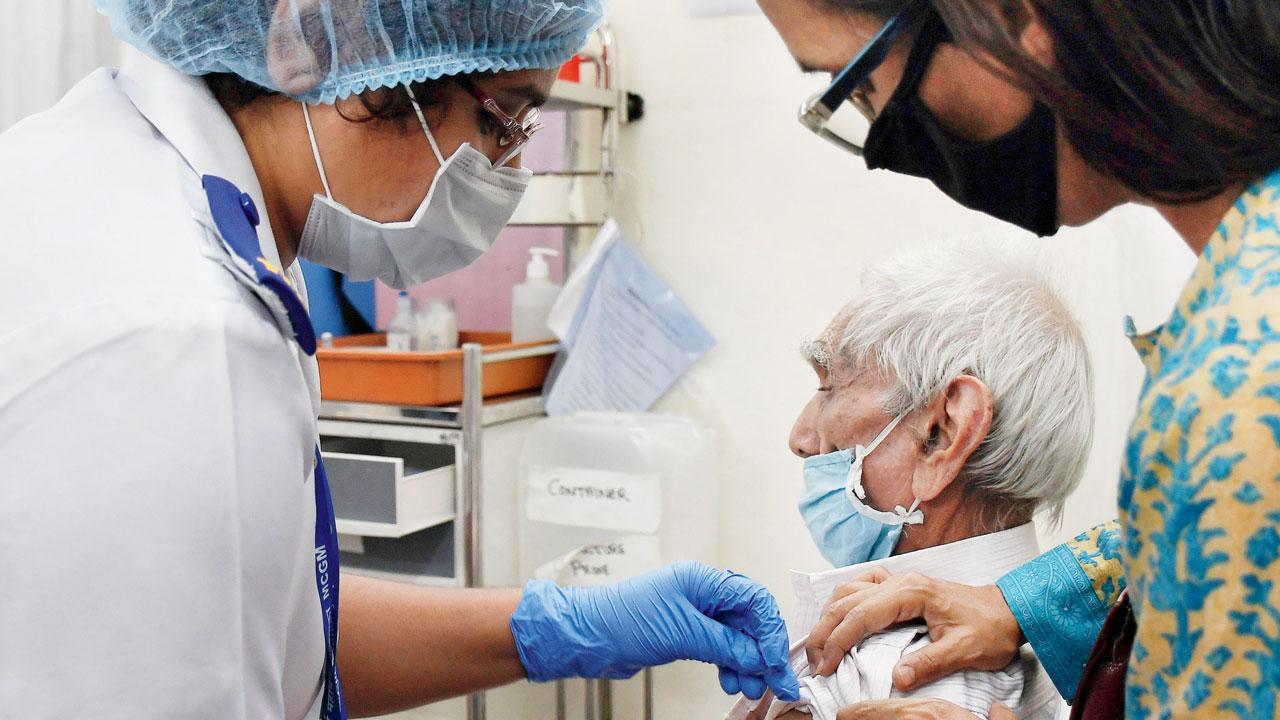Experts say the emergence of several mutated forms of coronavirus calls for constant updates in the strategies to tackle the COVID-19 pandemic

A senior citizen receives a vaccine at Nair hospital. File/Ashish Raje
How has COVID-19 permanently impacted vaccine development, particularly in the wake of talks over various strains of the virus? The British Medical Journal (BMJ) in its March 02 issue said Pfizer and Oxford-AstraZeneca were reported to be updating their vaccines to target new variants.
ADVERTISEMENT
Dr Wiqar Shaikh, Professor of Medicine, Grant Medical College and Sir J.J. Group of Hospitals, said the emergence of several mutational variants of SARS-CoV2, the virus that leads to COVID, is worrying. “We already have the UK, Brazilian and South African variants and a large number of variant-infected people have been detected in India. We need to be very aggressive in studying, detecting and managing COVID-19 variants in our country,” he explained.
Dr Shaikh said there is an urgent need to assess if the current vaccines provide adequate protection against all novel variants. “Global Data Healthcare said on March 03 that the COVID-19 vaccine’s effectiveness is negatively affected by variants. The WHO opined on the same day that the vaccines that are currently in development or have been approved are expected to provide only some protection against new virus variants.”
Other than Pfizer and AstraZeneca vaccine, BMJ also reported that American firm Moderna is awaiting regulatory approval to start trialling a modified version of its vaccine that will target COVID variants, Dr Shaikh said. He added, “A study published in the journal Cell this month noted that the protection induced by the current Pfizer and Moderna vaccines were less effective against the coronavirus variants first found in South Africa and Brazil.”
Dr Subhash Hira, Professor of Global Health at the University of Washington-Seattle, said, “The fundamental principle that applies to all microbes, namely viral, bacterial, rickettsial etc, is that during an epidemic, new variants of a microbe emerge. Its genome sequencing helps identify a ‘variant of concern’ (VoC) — one that leads to a rise in the number of cases or a spike in the number of deaths. Such emergence is kept under surveillance all along an epidemic, and early evidence warrants a change in national strategy for all protocols — from diagnostics to prevention to treatment.”
Added Dr Hira, “In COVID vaccine development, nations pursued the 6A framework, an approach that accelerates end-to-end planning to ensure vaccines are available, administrable, accessible, acceptable, affordable, and accountable. Countries took actions to speed up their efforts such as strengthening vaccine task forces, developing a delivery road map and efficient governance and a dependable supply-chain model. If done correctly, vaccine delivery efforts can save lives and restore livelihoods, strengthen public trust in governments, and allow us to start the ‘next normal’ world.”
Dr Ketan Vagholkar, Professor of Surgery at DY Patil Medical College, said, “We are seeing a steep increase in the number of fresh cases despite the vaccination drive being in full swing. Citizens need to understand that protection by the vaccine is achieved four to six weeks after the second jab. The protective efficacy needs to be tested by evaluating the protective antibody levels in the body. Whether the surge in cases is due to the original strain of the virus or is due to variant strains is under evaluation. Therefore, COVID-appropriate behaviour comprising wearing a mask, frequent hand washing and social distancing in public spaces, continues to be the mainstay of prevention.”
Global vaccine delivery (Mar 22)
Top three countries
US – 126.51 million
China – 74.96 million (March 20)
India – 48.49 million
Bottom 3 countries
Poland - 5.03 million (March 21)
Bangladesh - 4.91 million
Canada - 4.1 million
(Total number of vaccination doses administered. This is counted as a single dose and may not equal the total number of people vaccinated depending on specific dose regime - e.g. people receive multiple doses)
Source: Official data collated by OurWorldInData. org on March 23
 Subscribe today by clicking the link and stay updated with the latest news!" Click here!
Subscribe today by clicking the link and stay updated with the latest news!" Click here!






